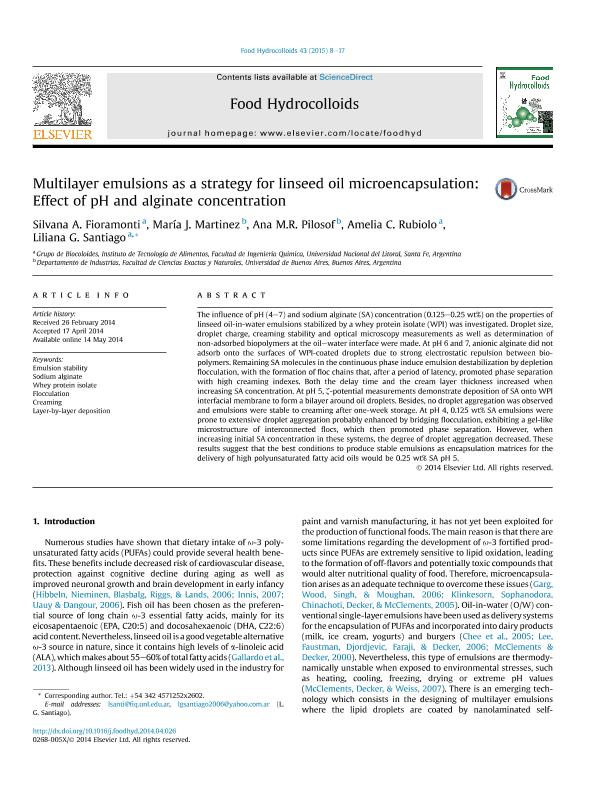Artículo
Multilayer emulsions as a strategy for linseed oil microencapsulation: Effect of pH and alginate concentration
Fioramonti, Silvana Alejandra ; Martinez, María Julia
; Martinez, María Julia ; Pilosof, Ana Maria Renata
; Pilosof, Ana Maria Renata ; Rubiolo, Amelia Catalina
; Rubiolo, Amelia Catalina ; Santiago, Liliana Gabriela
; Santiago, Liliana Gabriela
 ; Martinez, María Julia
; Martinez, María Julia ; Pilosof, Ana Maria Renata
; Pilosof, Ana Maria Renata ; Rubiolo, Amelia Catalina
; Rubiolo, Amelia Catalina ; Santiago, Liliana Gabriela
; Santiago, Liliana Gabriela
Fecha de publicación:
01/2015
Editorial:
Elsevier
Revista:
Food Hydrocolloids
ISSN:
0268-005X
Idioma:
Inglés
Tipo de recurso:
Artículo publicado
Clasificación temática:
Resumen
The influence of pH (4-7) and sodium alginate (SA) concentration (0.125-0.25wt%) on the properties of linseed oil-in-water emulsions stabilized by a whey protein isolate (WPI) was investigated. Droplet size, droplet charge, creaming stability and optical microscopy measurements as well as determination of non-adsorbed biopolymers at the oil-water interface were made. At pH 6 and 7, anionic alginate did not adsorb onto the surfaces of WPI-coated droplets due to strong electrostatic repulsion between biopolymers. Remaining SA molecules in the continuous phase induce emulsion destabilization by depletion flocculation, with the formation of floc chains that, after a period of latency, promoted phase separation with high creaming indexes. Both the delay time and the cream layer thickness increased when increasing SA concentration. At pH 5, ζ-potential measurements demonstrate deposition of SA onto WPI interfacial membrane to form a bilayer around oil droplets. Besides, no droplet aggregation was observed and emulsions were stable to creaming after one-week storage. At pH 4, 0.125wt% SA emulsions were prone to extensive droplet aggregation probably enhanced by bridging flocculation, exhibiting a gel-like microstructure of interconnected flocs, which then promoted phase separation. However, when increasing initial SA concentration in these systems, the degree of droplet aggregation decreased. These results suggestthat the best conditions to produce stable emulsions as encapsulation matrices for the delivery of high polyunsaturated fatty acid oils would be 0.25wt% SA pH 5.
Archivos asociados
Licencia
Identificadores
Colecciones
Articulos(OCA CIUDAD UNIVERSITARIA)
Articulos de OFICINA DE COORDINACION ADMINISTRATIVA CIUDAD UNIVERSITARIA
Articulos de OFICINA DE COORDINACION ADMINISTRATIVA CIUDAD UNIVERSITARIA
Citación
Fioramonti, Silvana Alejandra; Martinez, María Julia; Pilosof, Ana Maria Renata; Rubiolo, Amelia Catalina; Santiago, Liliana Gabriela; Multilayer emulsions as a strategy for linseed oil microencapsulation: Effect of pH and alginate concentration; Elsevier; Food Hydrocolloids; 43; 1-2015; 8-17
Compartir
Altmétricas



